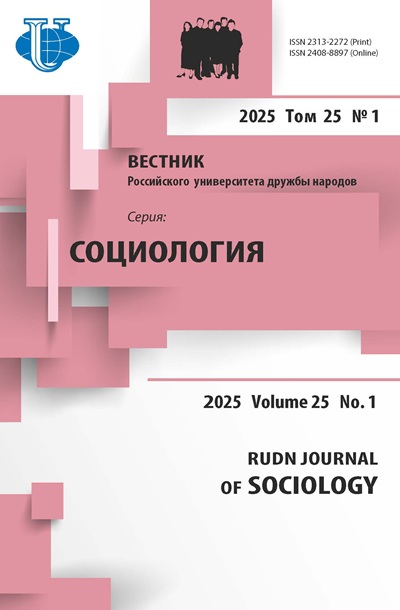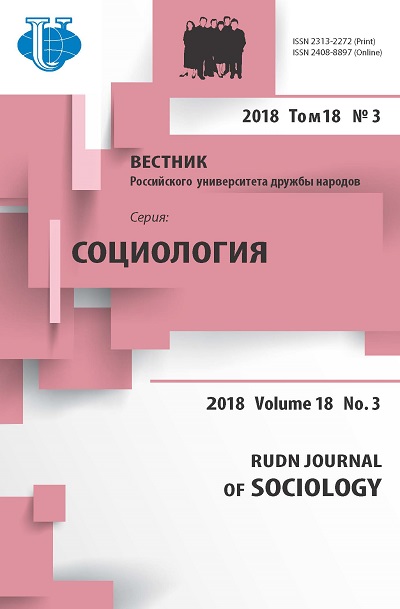THEORY OF FAMILY EDUCATION IN THE GENERAL THEORETICAL CONTEXT OF SOCIAL SCIENCES
- Authors: Dementieva IF1, Golenkova ZT2
-
Affiliations:
- Institute for the Study of Childhood, Family and Education of the Russian Academy of Education
- Federal Center of Theoretical and Applied Sociology of the Russian Academy of Sciences
- Issue: Vol 18, No 3 (2018)
- Pages: 542-554
- Section: Sociological lectures
- URL: https://journals.rudn.ru/sociology/article/view/19189
- DOI: https://doi.org/10.22363/2313-2272-2018-18-3-542-554
Cite item
Full Text
Abstract
The article considers the challenges for the development of the theory of family education as one of the youngest and most promising branches of the contemporary science. Today’s relevance of this theory is directly related to the transformations of the Russian society in the last decades, which had a great impact on the family ideology in general and changed the goals, objectives, content and methods of family education in particular. The theorists of the family education intensified the search for a new self-determination and a new identity for the Russian family as an educational institution. Under such conditions, the theory of family education adopts the conceptual findings and relevant ideas of other social sciences to develop methodology and techniques of raising and educating children in the family context. The article considers the sources of such ideas in the particular theories in the field of pedagogy, psychology, sociology, cultural studies, economics and informatics. The author identifies and briefly characterizes three groups of different social theories that contribute to a deeper understanding of the goals of family education: pedagogical theories (of free education, self-determination, self-education, culturally appropriate education, ecological education, assimilation and accommodation, pedagogy of cooperation, programmed teaching, pedagogical empiricism, and pedagogical education focused on children), psychological theories (of step-by-step formation of mental actions, personality, adaptation, affiliation, interpersonal interactions, activity mediation of interpersonal relationships, isolation, and imitation), and sociological theories (of globalization, social capital, information, social inequality, social risks, power sharing, gender, rational choice, synergetics, small groups, and mass communications).
About the authors
I F Dementieva
Institute for the Study of Childhood, Family and Education of the Russian Academy of Education
Author for correspondence.
Email: if.dementjewa@yandex.ru
-
Makarenko St., 5/16, Moscow, 105062, RussiaZ T Golenkova
Federal Center of Theoretical and Applied Sociology of the Russian Academy of Sciences
Email: golenko@isras.ru
-
Krzhizhanovskogo St., 24/35-5, Moscow, 117218, RussiaReferences
- Amonashvili Sh.A. Sozidaja cheloveka [Creating a Man]. Moscow; 1982 (In Russ.).
- Bozhovich L.I. Problemy formirovanija lichnosti: Izbrannye psihologicheskie trudy [Problems of Personality Formation: Selected Psychological Works]. Pod red. D.I. Feldshteyna. Moscow; 2001 (In Russ.).
- Weber M. Izbrannye proizvedenija [Selected Works]. Moscow; 1990 (In Russ.).
- Vernadsky V.I. Biosfera i noosfera [Biosphere and Noosphere]. Moscow; 1989 (In Russ.).
- Vygotsky L.S. Razvitie vysshih psikhicheskih funkcij [Development of Higher Mental Functions]. Moscow; 1960 (In Russ.).
- Vygotsky L.S. Sobranie sochinenij [Collected Works]. Vol. 3: Problemy razvitija psikhiki. Pod red. A.M. Matjushkina. Moscow; 1983 (In Russ.).
- Vygotsky L.S. Sobranie sochinenij [Collected Works]: v 6 tt. Moscow; 1982—1984 (In Russ.).
- Giddens E. Sudba, risk i bezopasnost [Fate, risk, and security]. THESIS. 1994: 5 (In Russ.).
- Gorshkov M.K., Sheregi F.E. Molodezh Rossii: sociologicheskij portret [Russian Youth: A Sociological Portrait]. Moscow; 2010 (In Russ.).
- Dementieva I.F. Socializacija detej v semie: teorii, faktory, modeli [Family Socialization of Children: Theories, Factors, and Models]. Moscow; 2004 (In Russ.).
- Diesterweg F.A. Rukovodstvo dlja nemeckih uchitelej [Guide for German Teachers]. Moscow; 1956 (In Russ.).
- Dewey J. Ot rebenka — k miru, ot mira — k rebenku [From Child to World, from World to Child]. Moscow; 2009 (In Russ.).
- Kogan V.Z. Teorija informacionnogo vzaimodejstvija: filosofsko-sociologicheskie ocherki [Theory of Information Interaction: Philosophical-Sociological Essays]. Novosibirsk; 1991 (In Russ.).
- Kon I.S. Vvedenie v seksologiju [Introduction to Sexology]. Moscow; 1988 (In Russ.).
- Konstantinovsky D.L. Dinamika neravenstva: rossijskaja molodezh v menjajuschemsja obshhestve: orientacii i puti v sfere obrazovanija (ot 1960-h k 2000-mu) [Dynamics of Inequality: Russian Youth in the Changing Society: Orientations and Paths in Education (from the 1960s to 2000)]. Moscow; 1999 (In Russ.).
- Coleman J. Kapital socialnyj i chelovecheskij [Social and human capital]. Obschestvennye Nauki i Sovremennost. 2001: 3 (In Russ.).
- Callahan D. Ekonomika dlja obychnyh ljudej: Osnovy avstrijskoj ekonomicheskoj shkoly [Economics for Real People: An Introduction to the Austrian School]. Chelyabinsk; 2006 (In Russ.).
- Leontiev A.N. Osnovy psiholingvistiki [The Basics of Psycholinguistics]. Moscow; 1997 (In Russ.).
- Liymets Kh. Gruppovaja rabota na uroke [Group Work in the Classroom]. Moscow; 1982 (In Russ.).
- Locke J. Sochinenija [Works]: v 3-h tt. Vol. 3. Moscow; 1988 (In Russ.).
- McLuhan M. Ponimanie media: vneshnie rasshirenija cheloveka [Understanding Media: The Extensions of Man]. Moscow; 2007 (In Russ.).
- Maslow A. Motivacija i lichnost [Motivation and Personality]. Saint Petersburg; 2003 (In Russ.).
- Moles A. Teorija informacii i esteticheskoe vosprijatie [Information Theory and Aesthetic Perception]. Moscow; 1966 (In Russ.).
- Montessori M. Moj metod [My Method]. Moscow; 2006 (In Russ.).
- Montessori M.M. Samovospitanie i samoobuchenie v nachalnoj shkole [Self-Education and Self-Development in Elementary School]. Moscow; 1922 (In Russ.).
- Norbert E. Obshhestvo individov [The Society of Individuals]. Moscow; 2001 (In Russ.).
- Petrovsky A.V. Lichnost, dejatelnost, kollektiv [Personality, Activity, Group]. Moscow; 1982 (In Russ.).
- Piaget J. Rech i myshlenie rebenka [The Language and Thought of the Child]. Moscow; 1994 (In Russ.).
- Skinner B.F. Nauka i chelovecheskoe povedenie [Science and Human Behavior]. Moscow; 1956 (In Russ.).
- Smelser N. Sociologija [Sociology]. Moscow; 1994 (In Russ.).
- Sukhomlinsy V.A. Etjudy o kommunisticheskom vospitanii [Essays on the Communist Education]. Moscow; 1967 (In Russ.).
- Fisher I. Pokupatelnaja sila deneg [The Purchasing Power of Money]. Moscow; 1994 (In Russ.).
- Heckhauzen H. Motivacija i dejatelnost [Motivation and Activity]. Vol. 1. Moscow; 1986 (In Russ.).
- Chomsky N. Jazyk i myshlenie [Language and Thought]. Moscow; 1968 (In Russ.).
- Shatsky S.T. Izbrannye pedagogicheskie sochinenija [Selected Pedagogical Works]: v 2-h tt. Moscow; 1980 (In Russ.).
- Sztompka P. Sociologija socialnyh izmenenij [The Sociology of Social Change]. Per. s angl. pod red. V.A. Yadova. Moscow; 1996 (In Russ.).
- Blumer G. Symbolic Interactionism: Problems and Perspectives. Englewood Cliffs; 1969.
- Drucker P. Post-Capitalist Society. New York; 1993.
- Hare A.P. Small Groups. New York; 1956.
- Homans G.C. The Human Group. New York; 1950.
- Keyns J.M. The General Theory of Employment Interest and Money. London; 1936.
- Lynn D.B. Parental and Sex-Role Identification: A Theoretical Formulation. California; 1969.
- Maslow A. Motivation and Personality. New York; 1954.
- McLuhan M. Culture is Our Business. New York; 1970.














